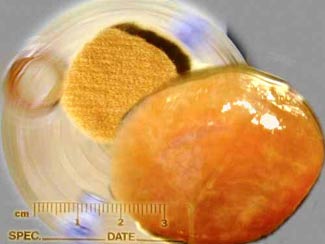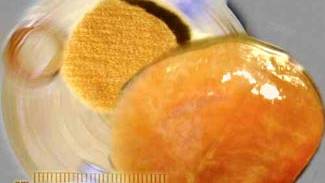Scientists Flesh Out Plans to Grow (and Sell) Test Tube Meat
Source: wired.com
 While in vitro meat is not currently produced industrially, Australian artists in the Tissue Culture and Art Project grew this test tube steak for their exhibition Disembodied Cuisine. Tissue Culture and Art (TCA) Australia |
According to a new economic analysis (.pdf) presented at this week's In Vitro Meat Symposium in Ås, Norway, meat grown in giant tanks known as bioreactors would cost between $5,200-$5,500 a ton (3,300 to 3,500 euros), which the analysis claims is cost competitive with European beef prices.
With a rising global middle class projected by the UN to double meat consumption (.pdf) by 2050, and livestock already responsible for 18 percent of greenhouse gases, the symposium is drawing a variety of scientists, environmentalists and food industry experts.
"We're looking to see if there are other technologies which can produce food for all the people on the planet," said Anthony Bennett of the United Nations Food and Agricultural Organization. "Not only today but over the next 10, 20, 30 years."
Rapidly evolving technology and increasing concern about the environmental impact of meat production are signs that vat-grown meat is moving from scientific curiosity to consumer option. In vitro meat production is a specialized form of tissue engineering, a biomedical practice in which scientists try to grow animal tissues like bone, skin, kidneys and hearts. Proponents say it will ultimately be a more efficient way to make animal meat, which would reduce the carbon footprint of meat products.
"To produce the meat we eat now, 75 to 95 percent of what we feed an animal is lost because of metabolism and inedible structures like skeleton or neurological tissue," Jason Matheny, a researcher at Johns Hopkins and co-founder of New Harvest, a nonprofit that promotes research on in vitro meat, told Wired.com. "With cultured meat, there's no body to support; you're only building the meat that eventually gets eaten."
Researchers can currently grow small amounts of meat in the lab, and have even been able to get heart cells to beat in Petri dishes. Growing muscle cells on an industrial scale is the next step, scientists say.
"That's the goal and it seems pretty clear from this conference that it's achievable," said Matheny on Thursday by telephone from the symposium.
Scientists are working on a variety of cell culture procedures. The cutting edge of in vitro meat engineering is the attempt to get cells to grow as if they were inside a living animal. Meat like steak is a complex combination of muscle, fat and other connective tissue. Reproducing the complexity of muscle is proving difficult.
"An actual whole muscle organ is not technically impossible," said Bob Dennis, a biomedical engineer at both North Carolina State University and the University of North Carolina, who attended the conference. "But of all the tissue engineering applications it is by far the most difficult one."
While scientists are struggling to recreate filet mignon, they anticipate less trouble growing hamburger.
"The general consensus is that minced meat or ground meat products -- sausage, chicken nuggets, hamburgers -- those are within technical reach," Matheny said. "We have the technology to make those things at scale with existing technology."
At scale, in this case, would be thousands of tons per year, Dennis said.
But once the meat is made, consumer acceptance is far from assured. What cultured meat will taste like is up in the air. Some scientists think it could be used to create novel foods that won't be quite meat, but won't quite be anything else either.
"I was once at a conference of food designers and they really liked the idea that they were not bound to a certain product that we know," said Stig Omholt, a professor at the Norwegian University of Life Sciences and chairman of the In Vitro Meat Consortium. "We could make novel products."
But most of the trends in food run counter to high-tech meat production. Heirloom tomatoes, organic produce and free-range-raised meat that pack the aisles of Whole Foods harken to previous, lower-tech eras.
None of the experts were sure if there is a large market of early adopters who want to eat test tube meat for environmental, health or ethical reasons.
For all the talk of high-tech meat production, attendees of the first In-Vitro Meat Symposium didn't put their stomachs where their mouths were. Instead of sampling early versions of in vitro meat, they stuck to local fare.
"We had some excellent Norwegian salmon, which was very tasty," Bennett said.
Article from: wired.com/science/discoveries/news/2008/04/invitro_meat






















